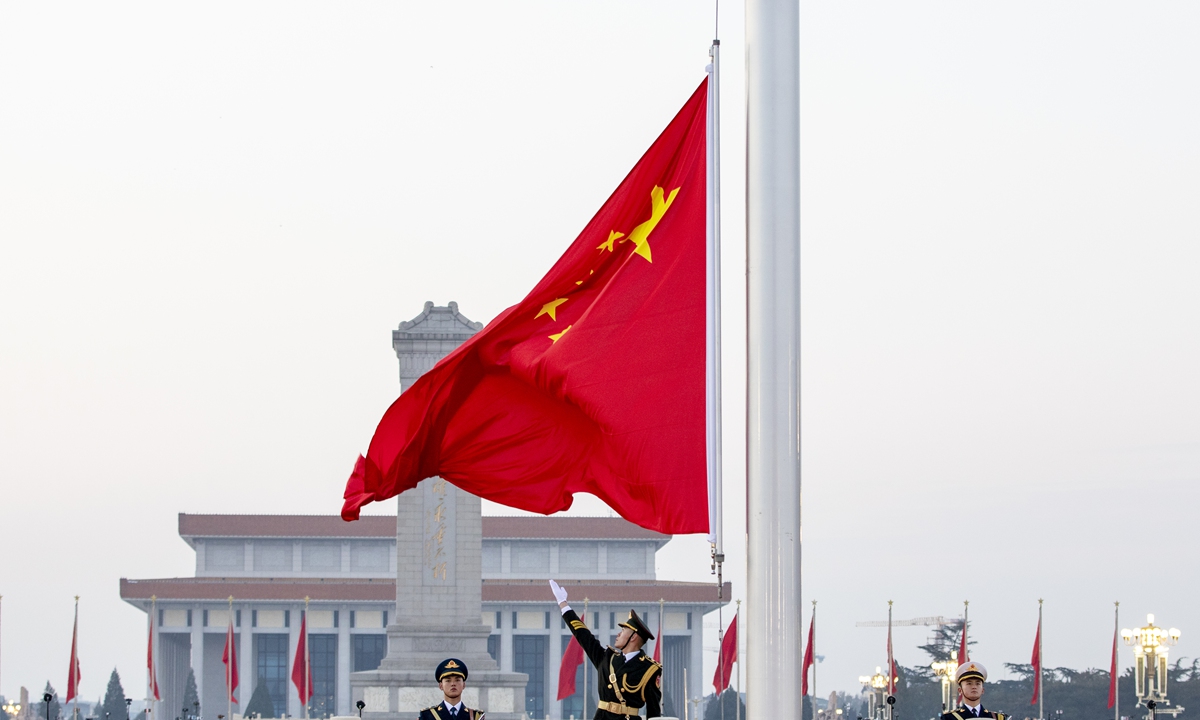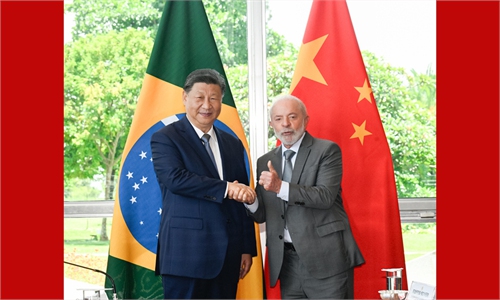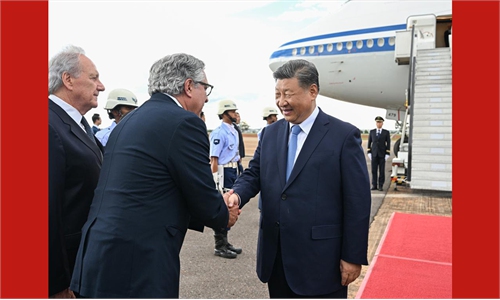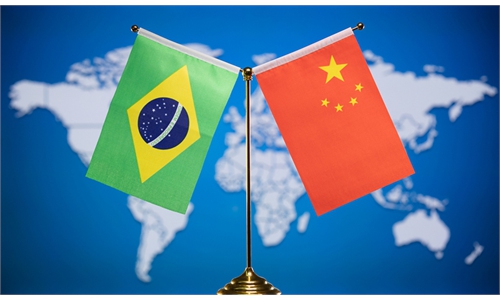2024Yearender: China demonstrates composure and confidence, injects stability into a turbulent world in 2024

China holds its first flag-raising ceremony of the new year on the Tiananmen Square in downtown Beijing on the early morning of January 1, 2024. More than 73,000 people, many of whom come from other parts of the country, gathered on the square to salute the rising of the Five-star Red Flag to mark the first day of 2024. Photo: VCG
As 2024 comes to an end, the accelerating evolution of profound global changes unseen in a century has become increasingly evident. From the ongoing Russia-Ukraine crisis to the Palestine-Israel conflict, from the sudden fall of Syria's Assad administration to the impeachment of South Korean President Yoon Suk-yeol, the intertwining characteristics of global changes and chaos have stood out more sharply, with issues of security disorder, developmental imbalances, and governance failures growing more prominent. Humanity once again stands at a crossroads.In 2024, China's diplomacy, at a historic juncture, upheld principles while embracing innovation. Amid turbulent and shifting circumstances, it demonstrated composure and confidence, creating a favorable external environment for China's high-quality development and injecting valuable stability into an increasingly unsettled world.
Over the past year, head-of-state diplomacy has written a grand new chapter, guiding the trend of the times toward peace, development, and win-win cooperation. Significant breakthroughs have been achieved in building a community with a shared future for mankind, advancing the historical trend of shared destiny and mutual support across the globe. Chinese modernization has provided new opportunities for the world, fostering the global momentum toward modernization in all countries. Cooperation with developing countries has set a new benchmark, gathering the tide of solidarity and self-reliance in the Global South. Progress has been made in deepening a comprehensive diplomatic framework, strengthening the progressive trend of building a new type of international relations, according to Member of the Political Bureau of the CPC Central Committee and Foreign Minister Wang Yi.
China, with a strong sense of responsibility, has strived to contribute much-needed stability, certainty and confidence to the world through its diplomatic efforts, highlighting China's unwavering pursuit of a new type of international relations and its commitment to building of a community with a shared future for mankind, Li Haidong, a professor at the China Foreign Affairs University, told the Global Times.
Guidance of head-of-state diplomacy
Over the past year, a remarkable new chapter has been written in head-of-state diplomacy, which has steered the trend of the times toward peace, development and win-win cooperation, Chinese Foreign Minister Wang Yi said on December 17 at a symposium on the international situation and China's foreign relations in 2024.
President Xi Jinping attended three home-ground diplomatic events - the Conference Marking the 70th Anniversary of the Five Principles of Peaceful Coexistence, the China-Arab States Cooperation Forum, and the Beijing Summit of the Forum on China-Africa Cooperation (FOCAC), and four important overseas visits - to Europe, to Central Asia, for the BRICS Summit, and to Latin America, and attended several multilateral summits.
With the global vision, broad-mindedness and sense of common good for humanity befitting the leader of a major party and a major country, President Xi has had in-depth strategic communications with global leaders and dignitaries to broaden converging interests for all and promote greater unity and cooperation of the international community, said the foreign minister.
Head-of-state diplomacy is the highest level of diplomacy. It can achieve political effects that ordinary diplomacy cannot reach, Wang told the Global Times at a press briefing in Brazil in November. "Under the leadership of President Xi and through head-of-state diplomacy, we will expand our voice and leverage our influence to ensure that the international community will be more united, develop further and better respond to current various challenges and risks," he said.
During these diplomatic events, new breakthroughs have been made in building a community with a shared future for mankind.
In the course of 2024, China and Brazil have announced joint efforts to build a China-Brazil community with a shared future for a more just world and a more sustainable planet, demonstrating their sense of responsibility as two emerging countries; China and Serbia have launched efforts to build a China-Serbia community with a shared future in the new era, the first of its kind in China's relations with European countries.
Globally, a growing number of countries have pitched in to build a community with a shared future. Chinese and African leaders have agreed to build an all-weather China-Africa community with a shared future for the new era, giving expression to the shared desire of the 2.8 billion Chinese and Africans to pursue common development in greater solidarity. China has also made efforts to build communities with a shared future with particular regions, including with Central Asia, ASEAN, countries in the Lancang-Mekong river basin, Arab states, and countries in Latin America and the Caribbean. These efforts are opening up new vistas of harmonious coexistence between different civilizations.
New type of intl relations
In 2024, China stood for dialogue and partnership rather than confrontation and alliance, fostered major-country dynamics featuring overall stability and balanced development, and worked with its neighbors for an amicable and harmonious home in Asia. It has made new progress in pursuing all-round diplomacy, which has built up the trend toward a new type of international relations, Wang said at the symposium.
The China-Russia relationship, under the visionary guidance of the two leaders, has grown more mature and stable, demonstrated in a clearer way its independence and resilience, and set an example of friendly exchanges between major countries and neighbors. The three meetings between President Xi and President Putin this year further deepened the China-Russia comprehensive strategic partnership. The two countries maintained close communication and coordination on multilateral platforms, such as the UN, BRICS and the Shanghai Cooperation Organization (SCO), and in regional affairs, fulfilling their responsibilities as major countries.
On China-US relations, President Xi met with President Biden and sent a congratulatory message to President-Elect Trump, providing strategic guidance for the growth of China-US relationship at this critical juncture.
He stressed that China's goal of a steady, sound and sustainable development of China-US relationship remains unchanged; its commitment to mutual respect, peaceful coexistence, and win-win cooperation as principles for handling China-US relations remains unchanged; its position of resolutely safeguarding China's sovereignty, security and development interests remains unchanged; and its desire to carry forward the traditional friendship between the Chinese and American people remains unchanged.
According to Li Haidong, China maintained its consistent stance and demonstrated sincerity over China-US relations in 2024, which is extremely important to stabilizing the major power dynamics.
In May this year, President Xi paid a historic visit to Europe. The visit ushered the China-France diplomatic relationship, which has spanned 60 years, into a new 60-year cycle of further development, enhanced the ironclad friendship between China and Serbia, and elevated the China-Hungary relationship to an all-weather comprehensive strategic partnership for the new era. President Xi also engaged in in-depth strategic communication with leaders of European countries such as Germany, the UK, Spain and Italy on bilateral and multilateral occasions, and encouraged the European side to take a long-term and strategic perspective, see China as a partner and strengthen dialogue and cooperation to the benefit of both sides and the world at large.
The China-EU relationship has maintained a stable track in 2024, despite challenges as a result of EV frictions and elections of the EU bodies, Cui Hongjian, a professor with the Academy of Regional and Global Governance with Beijing Foreign Studies University, told the Global Times.
Next year marks the 50th anniversary of the establishment of diplomatic relations between China and the EU. China's attitude toward bilateral relations is rational and consistent. What we need to do is to make clear cooperation as the direction while not sidestepping problems, managing differences effectively in a way that both sides can accept, Cui said.
In the direction of neighboring diplomacy, China and the ASEAN reached substantial conclusion of negotiations on the Version 3.0 China-ASEAN Free Trade Area (FTA), highlighting deepening market integration amid rise of protectionism; it acted with restraint on the South China Sea amid provocations while seeking expansion of security cooperation; China and India have overcome the border row, leading to the resumption of multiple communication mechanisms and a strong momentum of bilateral warming-up; China and Central Asia continue close cooperation, paving way to a successful second China-Central Asia Summit scheduled for 2025.
As a responsible major power, China, by properly managing its relations with Russia, the US, the EU, its neighboring countries and beyond, is making significant contributions to global security, said Jiang Feng, research fellow at the Shanghai International Studies University and president of the Shanghai Association of Regional and Country Studies.
Of Global South, for Global South
President Xi said that no matter how the international situation changes, China always bears the Global South in mind and is rooted in the Global South when addressing the BRICS Plus leaders' dialogue in October.
At the G20 Summit, Xi stressed that China will always be a member of the Global South, a reliable long-term partner of fellow developing countries, and a doer and go-getter working for the cause of global development. China will go hand in hand with fellow developing countries toward modernization, he said.
Starting December 1, China offers zero-tariff treatment for 100 percent tariff lines to all the least developed countries having diplomatic relations with China.
The Group of "Friends for Peace" on the Ukraine crisis, established in September at the UN headquarters, had the second meeting on December 18 in New York with the participation of representatives from 17 Global South countries, including China, Brazil, Algeria, South Africa and Turkey.
The UN General Assembly on July 1 unanimously adopted a resolution proposed by China and co-sponsored by over 140 countries on strengthening international cooperation in the capacity building of AI. It aims to bridge the digital divide, improve global AI governance, and accelerate the implementation of the 2030 Agenda for Sustainable Development.
Through these efforts, China upholds economic globalization and shares its opportunities with the world, seeks to amplify the voice of the Global South at international stage, and unites the Global South in multilateral mechanisms, said Li Haidong.
There will be challenges in 2025 for the world, and China has the confidence and capability to handle its own affairs and continue to be a force for peace, unity, openness, justice and inclusiveness, Li said.
The overall direction of human development and progress has not changed, the trend of the world moving forward despite twists and turns has not changed, the willingness of all humanity to promote economic globalization and share development and prosperity has not changed, and the hope and determination of all humanity for peaceful development have also not changed, Diao Daming, a professor at the Renmin University of China in Beijing, said. "We should recognize these positive aspirations and transform them into positive actions and strength."



